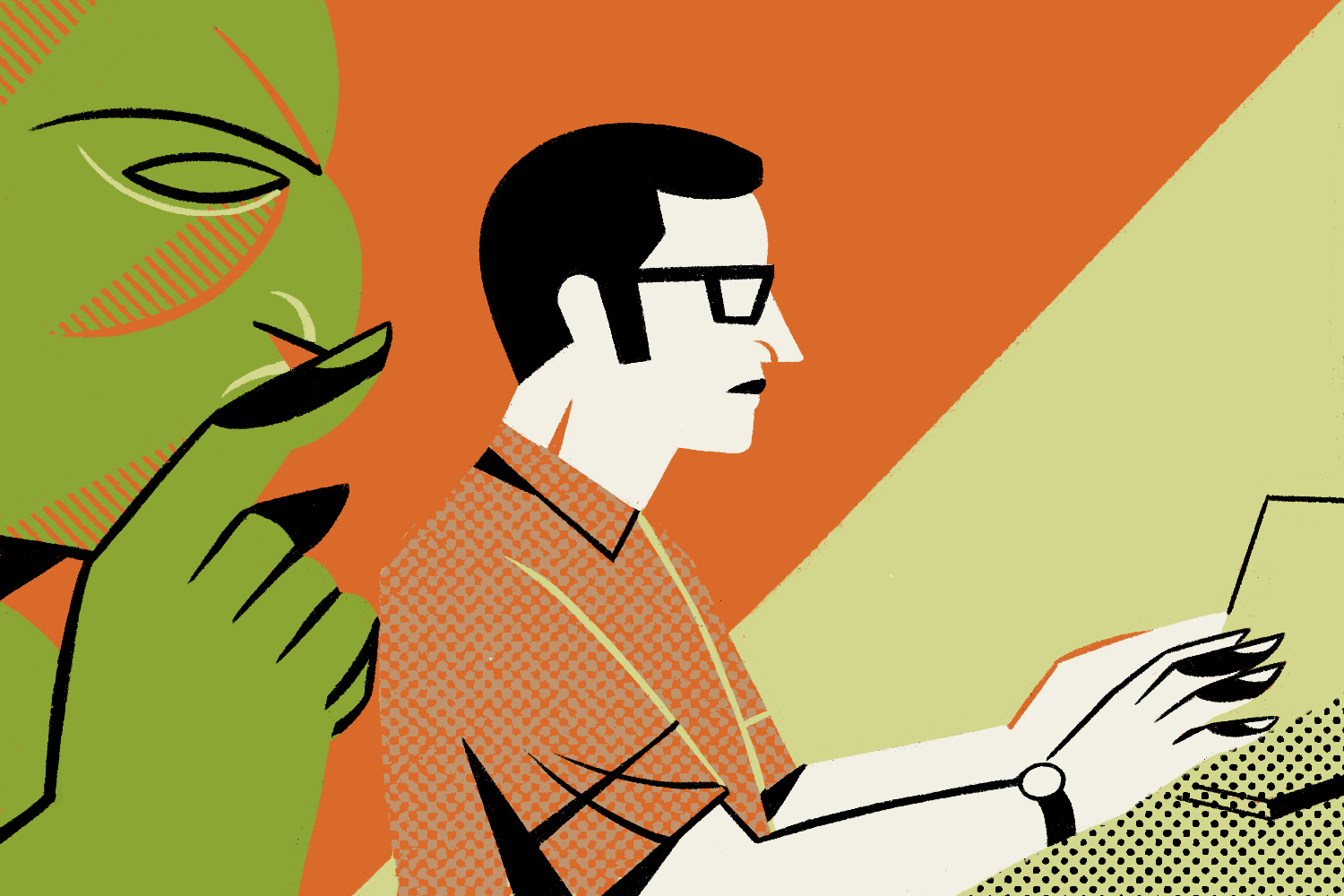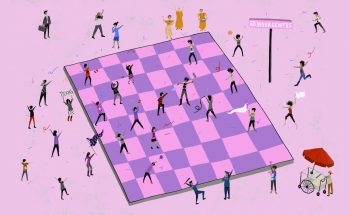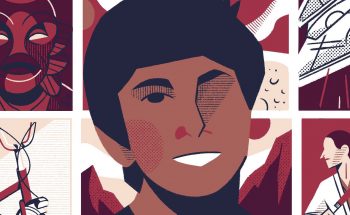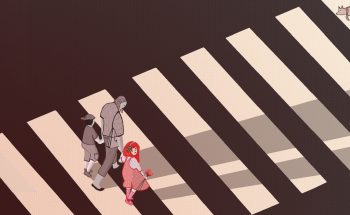
Translation: The Correspondent
Share:
Daniel Alarcón: Hey, I’m Daniel Alarcón, executive producer of Radio Ambulante.
Today’s episode marks the end of our fourth season. We’re going to take break in order to get ready for 2016 before bringing you more stories, but it’s been a good year, no?
From Cuba, we brought you the story of the remaining survivors of the Friki movement:
The Survivors: It was a strange cult that was more like a religious brotherhood because we were all very close.
Daniel: From Ecuador we heard the story of Crudo, a citizen that dared to make fun of the president.
Correo vs Crudo: Many people had the image that the president had created of me, that I was a dangerous subversive, almost like a spy or something like that.
Daniel: And so much more: Guatemala, Puerto Rico, Mexico, Colombia, Peru, Chile, the United States, Honduras, Venezuela, and El Salvador. When we started Radio Ambulante, that’s what we wanted to do: get to know our region better, get to know the voices of our countries. To be heard amongst ourselves. And from that point of view, we’re ending the fourth season proud and satisfied. I hope you feel the same.
If you listen to this podcast, you know our content is completely free. But our work isn’t. Salaries, equipment, travel, freelance producers. Everything you can imagine it takes for a multinational project like this. That comes with a cost. And it’s not cheap.
So I want to ask you for a favor: that you help us. On our website, you’ll find a button that says “Donate.” There you can give whatever amount you are comfortable with, or even better, sign up as a monthly donor. That’s the best way to support us and to assure the podcast can keep going.
This year we’re looking for 500 sustainable donors, that is, subscribers. That would help us to sustain the podcast. We invite you to support us with whatever you can give, maybe that’s only $5 a month or maybe you can give $20. Whatever it may be, really, it helps.
And well, thank you for everything. I’m not exaggerating when I say that we wouldn’t exist without you. Thank you for your feedback on social media, for sharing our stories, for sending us emails, for telling us what you enjoyed, and what you didn’t. Together we’ve created an international community of listeners that values these Latin American stories.
On behalf of the entire team, we wish you the best for the end of this year.
And now, the episode.
—
Alberto Arce: I came into journalism through a fairly simple mechanism which is: Where does nobody else want to go? Which places are the most complicated? Dangerous? Tough? Where there’s nobody else? That is, what are the places where I have the best chance to succeed with my work? If it can’t be done, if it’s too hard, if nobody else is doing it, that’s where I go.
Daniel Alarcón: This is Alberto Arce, a 39-year-old Spanish journalist. Between 2012 and 2014, Alberto was the only foreign correspondent in Honduras. Other journalists came to cover the news once in a while, of course, but during that time, the only one that worked on the daily beat in Tegucigalpa was Alberto.
We decided to speak with him because sometimes it’s important to understand the outsider’s point of view. That view sometimes reveals a lot, and allows us to see our own reality with more clarity…
Alberto Arce: I came to Honduras without thinking about it, without knowing anything about Honduras, like a tabula rasa, zero. I knew little more than what the majority of people know: that there was a coup d’etat in 2009. I didn’t know anything else.
Daniel Alarcón: Welcome to Radio Ambulante, I’m Daniel Alarcón. For this episode, we’re using a narrative style that we’ve used a couple of times this year on Radio Ambulante. You’re going to hear just one voice: Alberto’s.
He spoke with our editor and producer, Silvia Viñas.
Here’s Alberto.
Alberto Arce: Basically, I came to Honduras to escape unemployment. That is, I’m a Spaniard that belongs to a generation where journalism already seemed played out, so I had to leave to make a life for myself, like others, like tens of thousands of people from my generation. I started from nothing at about 35 years old, I think. And after 7 or 8 months of working at a media company in Guatemala called Plaza Pública, a job opportunity came from the Associated Press looking for a correspondent in Honduras. They never said anything to me and I think I never asked them about it, but I’m afraid there wasn’t much competition. There weren’t dozens of people lining up with resumes to go with their families to live in Tegucigalpa. So that’s how I ended up in Honduras.
I had very little time from when I knew I was going to Honduras to when I physically got to Tegucigalpa. Very little time. I had read some stuff on the Internet and I remember I went on YouTube looking for videos of the streets of Tegucigalpa to give myself an idea.
I remember I landed in Tegucigalpa on a Saturday or a Sunday. My family hadn’t arrived yet and it was really…I remember I had no money. Then I recall spending a Sunday afternoon by myself going around in circles in downtown Tegucigalpa, and the impression of these empty, dirty streets, with dogs picking through the garbage. There was nobody, you know? It was this sensation that in any moment you were going to be stopped by…someone on a motorcycle, in a car, and they were going to pull a gun out and take everything from you. It was fear, you know? The fear that someone who knows nothing has.
But the only way of getting to know any country, especially a country as complicated as Honduras, is to go out into the street, to break this invisible wall that separates an outsider from a Honduran. What you have to do is open the door, get in a taxi, get on the bus, go out into the street, go to the markets, go to different neighborhoods, go to different districts, and truly listen to people. If Honduras, for the most part, defines itself through its violence, you will only be able to speak about it if you try to involve yourself in the daily life of the people who suffer that violence.
And that’s what I learned in Honduras: journalism can’t be done from hotels, it gets done on the ground.
Four days after arriving in Honduras, I went with Esteban Felix, a photographer for the AP, to San Pedro Sula, on patrol with the police for two nights. The first day, literally the first day, the police in front of us stopped a member of the Mara Salvatrucha. He started to cry and I asked, “Why is he crying if they’re supposed to be tough guys?” And the police told me: “Because they know when we catch them, we kill them, but this one is safe because you guys are here.” From the first day I arrived in Honduras, the police told me gang members they catch, they kill. They kill as many as they can. So from the first day, I knew what went on. It took me a year to find a case to report on. That was the Teiker case. If I remember well, it was exactly one year after my arrival in Honduras.
Teiker’s name was Kevin Carranza Padilla. He was someone who called the shots for Barrio 18 in a specific territory in Tegucigalpa. That is, he wasn’t just any gang member, he was the gang leader of about 10 to 12 other members. He lived with his girlfriend and their dog in a neighborhood in Tegucigalpa. And one day, a group of hooded, armed men, entered his house, knocked the door down, took them away, and they were never seen again.
And what makes the Teiker case different from the rest is that it says a lot of things about Honduras. First of all, I found out about him because, like I did every day at 8 in the morning, I opened the El Heraldo newspaper, and I saw a headline that says they captured a gang member linked to the murder of a deputy commissioner. And what I see is a photograph of a person spread out on the floor with tape around his eyes and a big 18 on his chest, evidently tortured. And you see a pair of shoes nearby that don’t belong to a gang member. It suddenly hits me that they belong to a police officer. That is, who is that stupid to take a photo during a torture session and send it to a newspaper? And the newspaper is foolish enough to publish it without questioning it. Or rather, without doing their job.
And so that tells me a lot of things. First, people keep disappearing. Second, it’s probably the police. And third, the police share these photos with journalists, and the journalists, lacking any sort of judgement, publish these photos–because in the kingdom of impunity, impunity is just as important for the police committing the crimes as it is for the journalists that don’t question them. So right away I have a story.
I immediately go to the place that Teiker theoretically controlled, and it’s not that hard! I know said neighborhood is controlled by a gang. So I know from the moment I arrive in a taxi and enter this area, I’m aware of myself and start walking through the neighborhood as a series of people start monitoring each of my movements. They are usually young children that they call flags, which is like a kind of gang recruit. o then you immediately notice that there are people looking at you and you get closer to them and say: “I’m a journalist. I want to know what happened with Teiker. I have a feeling the police took him. I am a foreign journalist that would like to tell the story.” It’s not that hard to approach a gang. It probably isn’t safe, but that’s how it works.
Someone from a church helped me to get to the gang’s second level command so that they could decide whether to get to know me, so that I could tell them that I wanted to know what happened and if they could help me speak to the rest of the people that were in touch with Teiker in those days.
It turns out that along with Teiker, several other gang members had disappeared as well. Then it’s like a thread that starts to unravel and more names begin to appear. So in order to know what happened to these other names, you have to speak with the people they knew.
I remember when I met with a decent amount of gang members in person, well one person, a contact, spoke and received authorization for me to come. So they told me, “Get in a taxi until the supermarket parking lot. In the lot of that supermarket, another taxi is going to be waiting for you, you get in the other taxi and you’ll be on your way.” I arrived in that taxi. I got out at a predetermined spot in the neighborhood. There’s a 14-year-old kid that tells me to walk with him. I walk four or five blocks, go inside a house, and in that house a dozen of them, heavily armed, are waiting for me.
I remember it was a Saturday morning, I don’t know, 9 or 10 in the morning, it was early. There were several people shirtless, guns in their belts, mini Uzis, machine guns. They were smoking, getting stoned. They were really high.
So I remember trying to talk to them for 30 or 40 minutes and realizing that I couldn’t get anything out of them because they didn’t want to tell me anything, because they were high, and because in reality, any one of those idiots might want to show off to his friends, take out his gun and shoot me in the head as a way of saying, “Look how badass I am.” That is, these are the things that come to your mind. Obviously, it didn’t happen because…it’s an organization with a hierarchy. If they didn’t want to talk to you, they wouldn’t have let you get to them in the first place. And once you have entered, unless you do something stupid for them to suspect you’re a DEA agent or something, nothing will happen.
The problem is that obviously you can’t believe their friends’ versions 100% either, or rather, you have to verify them in a lot of ways. In Teiker’s case, what you learn in the hood is that the person could have disappeared with a uniformed officer; they could have disappeared with a plainclothes officer; they could have been members of a rival gang dressed as police officers, sent by police that work with the rival gang or with the same gang because the police chief was fed up with him because he didn’t properly distribute the amount of money that he owed them… Then you enter into a reality that is so… I don’t know how to explain it…so amorphous, like a piece of clay, that it’s difficult to establish rules, and it’s really impossible to establish with certainty what it is that actually happened.
I could make myself look like this epic person that infiltrated unknown gang territory. But a lot of times, the epic, movie-like vision of a seasoned journalist with a bulletproof vest is all there is, very removed from the clear message you are trying to convey with this work. And that is that in Honduras there are these armed groups that are gangs, at least 5 in Tegucigalpa, that are also drug dealers, that are also rogue police officers, on-duty officers, and that they are all at war–I wouldn’t dare say that this is a low-intensity war because it’s responsible for as many deaths as an all-out war–and this war evidently keeps moving forward destroying whatever is perceived to be the rule of law. So there we understand the circle, the circle of violence, the impunity, the terror injected into the population, the displacement of people, the homicide rates, the drug trafficking, the extortion. That is, there’s a circle that you can write about based on the disappearance of a gang member.
Most of your social circle is going to tell you that you’re defending the gang members, and that they’re a bunch of assholes who don’t deserve to be defended, that they deserve to be exterminated. And it’s tough, it’s hard to feel you’re surrounded by people that won’t support you if you report the cops that are committing these extrajudicial killings.
And the other reaction, from a professional circle of journalists is: “Hey, if you don’t stop they’re going to kill you.” So you’re under pressure…I never thought they were going to kill me, I never took it seriously, it wasn’t real to me. But you get…or rather, it’s like a fly that won’t stop: “You’re getting into these messes, you’re getting into trouble, you giving yourself problems. Stop. It doesn’t make sense. You’re getting involved with the wrong people.” And it’s true. You know you’re getting involved with bad people. But I was always aware that, first, I wasn’t saying anything that everyone didn’t know already, and two, being a foreigner, nothing bad was going to happen to me, and if they got close to me, I’d be able to make a quick getaway.
News Montage: The corruption crisis that Honduras has been living through for decades reveals a 76% increase in poverty and reaffirms”…“And it was shown that police were involved in the youngster’s deaths”…“I think that corruption and impunity have reached a point where they affect our entire system…”
Alberto: If I had arrived in Honduras as a 23-year-old, single, I would have stayed in Honduras for 15 years. Honduras is a country that deserves for its story to be told. It’s a country that I’ve obviously come to empathize with. It’s a country where until there are more people telling its story, those who are doing it have to continue out of a societal obligation, a responsibility to Honduras. The problem with this duality between journalist and father, is that, well, obviously I have to put my family first.
News Montage: “It’s a shame that despite the efforts that have been made to clean up the national police force, so far there have been no results and evidence shows that things remain the same.”… “Authority figures in this country, namely the President and the Security Minister, settle for these corrupt officials. So what has happened?”… “To achieve peace and maintain a country free of impunity!”
Alberto: It’s really frustrating as a journalist to understand that reporting systematic human rights abuses doesn’t have any kind of political or institutional consequence. That is to say, the same countries that finance and help the Honduran police keep doing it. The same police officers that were killing 10, 20 years ago, continue to do so into the present. So that…that’s tough because you realize that the reporting you’re doing falls on deaf ears. It’s worthless. It won’t help change the reality of political institutions, nor help the society reflect on itself and what those institutions are collectively turning the country into.
In the end, journalism is almost like a show, right? Or rather, let’s see what is the most shocking, gruesome, grotesque, denigrating story we can tell about Honduras, to see how much blood we can pour over Honduras in order to capture the reader’s attention for at least three paragraphs. That’s the feeling, you know? I’m only good for that. And if I’m only good for a Facebook click that holds your attention for 30 seconds, it’s not worth putting in danger a mother living in a Honduran slum who could be executed for talking to be. The level of frustration that comes from being a reporter and realizing how little journalism is worth…what do you want me to tell you?
But what do we do? Do I become this gray blob that only goes to his desk to copy-paste? Or rather, we live in a society that allows for 70% of Hondurans to be condemned from the moment they are born to overcome little more than illiteracy because we live in a system that doesn’t need the Honduran factory worker making Levis for the United States to know little else besides reading and writing in order to sign his contract. That’s the system we live in. And if we accept it and stop fighting against it through the means that we have at the moment, which is journalism, then let’s call it a day.
Daniel Alarcón: Alberto Arce is a correspondent for the Associated Press in Mexico. You can read more about his experiences as a journalist in Honduras in his book “Novato en nota roja,” published by Libros del K.O. Press. We have links to some of his articles on our website, including his report on the Teiker case.
Silvia Viñas is a producer and editor for Radio Ambulante. Thanks to Whitney Eulich for recording Alberto from Mexico City.
Camila Segura is the Senior Editor for Radio Ambualnte. Martina Castro is the Senior Producer. The rest of the team includes Luis Trelles, Clara González Sueyro, David Pastor, David Leonard, Barbara Sawhill, Alejandra Quintero Nonsoque, Claire Mullen, and Diana Buendía. Carolina Guerrero is our Executive Director.
Radio Ambulante tells the stories of Latin America. To hear more, visit our website radioambulante.org. I’m Daniel Alarcón. Thank you for listening.





